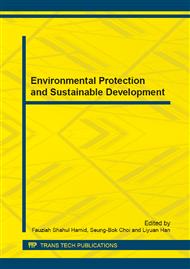p.1771
p.1776
p.1782
p.1791
p.1798
p.1806
p.1810
p.1817
p.1822
Coupling Coordinative Degree of Tourism-Economy-Environment System - Take Resource-Based Cities in Shanxi Province as a Case
Abstract:
As typical cities of natural resources exploitation and processing, to make less reliant to natural resources and to regain more Sustainable development power are important issues and pressing tasks for resource-based cities in China. Based on the theory of ecological civilization and sustainable development, this study formulated a coupling coordinative model of tourism-regional economy-ecological environment system, and made a comparison with the coupling relationship among the tourism-regional economy-ecological environment system using 2005-2010 statistics data of three typical cities in Shanxi province by entropy method, which reaches the following conclusions that: It found widespread coupling interaction in the compound system of tourism-regional economy-ecological environment in these three cities; Differences in the aspects of tourist market, geographical location, industrial structure, tourism resources, urbanization process and climatic conditions are the keys to form the coupling relationship; Evaluation on the coupling coordinative degree provides a useful reference for sustainable development of tourism industry in future.
Info:
Periodical:
Pages:
1798-1805
Citation:
Online since:
February 2014
Authors:
Price:
Сopyright:
© 2014 Trans Tech Publications Ltd. All Rights Reserved
Share:
Citation:


